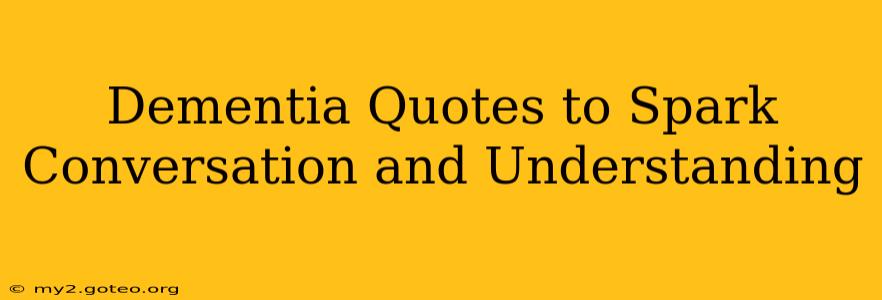Dementia, an umbrella term encompassing various neurodegenerative diseases like Alzheimer's, is a complex and often misunderstood condition. It affects not only the individual diagnosed but also their families and caregivers. Sharing quotes about dementia can be a powerful way to initiate conversations, foster empathy, and deepen understanding. These carefully selected quotes offer different perspectives on the challenges and triumphs associated with living with and caring for someone with dementia.
What are the early signs of dementia?
Early signs of dementia can be subtle and easily overlooked, often mistaken for normal aging. However, persistent changes in cognitive function warrant professional attention. These include:
- Memory loss: Difficulty remembering recently learned information, repeatedly asking the same questions, or forgetting appointments.
- Challenges with problem-solving or planning: Struggling with familiar tasks, such as balancing a checkbook or planning a meal.
- Difficulties with language: Trouble finding the right words, understanding conversations, or following instructions.
- Disorientation: Getting lost in familiar places, losing track of time or date, or confusion about one's surroundings.
- Changes in personality or mood: Increased anxiety, depression, irritability, or apathy.
- Impaired judgment: Making poor decisions or exhibiting unusual behavior.
If you notice these changes in yourself or a loved one, seeking professional medical evaluation is crucial for early diagnosis and intervention. Early diagnosis allows for earlier access to support services and treatment options, potentially slowing disease progression.
How do you talk to someone with dementia?
Communicating with someone experiencing dementia requires patience, understanding, and a different approach than typical conversations. Here are some helpful tips:
- Speak clearly and slowly: Avoid rushing or using complex language.
- Use simple sentences: Break down instructions into smaller, manageable steps.
- Maintain eye contact: This helps the person feel seen and heard.
- Be patient and understanding: Allow extra time for responses and avoid interrupting.
- Use nonverbal cues: Gestures, facial expressions, and touch can aid communication.
- Focus on the person, not the disease: Remember their identity and individuality, even if their memory has deteriorated.
- Redirect rather than correct: If the person is confused or agitated, gently redirect their attention to a more calming activity.
- Keep a positive attitude: Your calmness and patience can significantly impact the interaction.
Remember, effective communication is about connecting, not correcting. Empathy and patience are key components of successful interactions with individuals living with dementia.
What are the different stages of dementia?
Dementia is a progressive disease, meaning its symptoms worsen over time. While the specific progression varies depending on the type of dementia, several stages are generally recognized:
- Mild cognitive impairment (MCI): This early stage involves subtle cognitive changes that don't significantly impact daily life.
- Early-stage dementia: More noticeable cognitive decline impacts daily tasks, but the person can still live relatively independently.
- Middle-stage dementia: Significant cognitive decline requires increased assistance with daily tasks. Behavioral changes and memory loss become more pronounced.
- Late-stage dementia: The person requires extensive care and assistance with all aspects of daily living. Communication becomes severely limited.
Understanding the different stages helps caregivers anticipate changes and adapt their support accordingly. Each stage presents unique challenges and necessitates different care strategies.
What is the life expectancy of someone with dementia?
Life expectancy for individuals with dementia varies significantly depending on several factors, including the type of dementia, age at diagnosis, overall health, and access to care. It’s impossible to give a precise number. The progression of the disease also greatly impacts life expectancy, with some individuals living for many years after diagnosis, while others experience a more rapid decline. Focusing on improving the quality of life during the journey is paramount, rather than solely focusing on the timeline.
Inspiring Quotes about Dementia:
Here are a few quotes that can help initiate conversations and promote understanding:
- "Dementia may take away memories, but it doesn't take away love." - This quote emphasizes the enduring power of love despite the challenges of dementia.
- "The person with dementia is still there. It's just harder to find them sometimes." - This quote highlights the importance of recognizing the person behind the disease.
- "It's not about what's lost, but what's left." - This quote encourages focusing on the remaining abilities and strengths.
- "Remember who they are, not what they've forgotten." - This quote underscores the significance of maintaining connection with the individual's identity.
These quotes can serve as starting points for conversations about the impact of dementia and the importance of compassion and understanding. Remember, sharing these quotes is just one step in raising awareness and building a supportive community for those affected by dementia.

